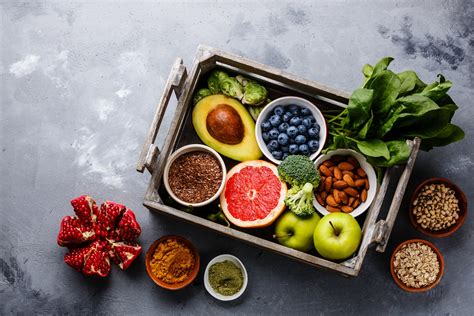The Top 5 Superfoods to Add to Your Diet

Superfoods are nutrient-dense foods that pack a powerful punch of vitamins, minerals, antioxidants, and other beneficial compounds that can support overall health and well-being. Incorporating these foods into your daily diet can help improve immunity, boost energy levels, and reduce the risk of chronic diseases. If you’re looking to supercharge your diet, here are five of the top superfoods to consider adding to your meals.
Blueberries: The Antioxidant Powerhouse
Blueberries have long been celebrated for their antioxidant-rich profile, particularly anthocyanins, which give them their deep blue color. These antioxidants help neutralize free radicals in the body, which can damage cells and contribute to aging and chronic disease.
Health Benefits:
- Brain Health: Studies suggest that blueberries may help improve memory and cognitive function, particularly in aging adults.
- Heart Health: The antioxidants and fiber in blueberries contribute to reducing the risk of heart disease by lowering blood pressure and cholesterol levels.
- Anti-Inflammatory: Blueberries have natural anti-inflammatory properties that can help reduce the risk of inflammation-related conditions like arthritis.
How to Use:
Add fresh or frozen blueberries to smoothies, oatmeal, yogurt, or salads. You can also enjoy them as a snack on their own.
Kale: A Leafy Green Powerhouse
Kale is one of the most nutrient-dense vegetables available. Rich in vitamins A, C, and K, as well as folate and fiber, kale is an essential addition to any healthy diet. This dark leafy green is also high in antioxidants like lutein and zeaxanthin, which promote eye health.
Health Benefits:
- Bone Health: Kale’s high vitamin K content is essential for bone health, helping to regulate calcium levels and support bone mineralization.
- Detoxification: Kale supports the liver in detoxifying the body and is rich in fiber, which aids digestion and promotes a healthy gut.
- Cancer Prevention: Kale contains compounds called glucosinolates that have been shown to reduce the risk of certain types of cancer.
How to Use:
Add kale to salads, smoothies, soups, or as a sautéed side dish. For a crispy treat, try making kale chips by roasting them in the oven with a little olive oil and seasoning.
Chia Seeds: Tiny but Mighty
Chia seeds may be small, but they are packed with nutrients. These tiny seeds are an excellent source of omega-3 fatty acids, fiber, protein, and minerals like calcium and magnesium. Chia seeds are also one of the best plant-based sources of ALA (alpha-linolenic acid), a type of omega-3 fat that is beneficial for heart health.
Health Benefits:
- Heart Health: The omega-3s in chia seeds help reduce inflammation, lower blood pressure, and improve cholesterol levels.
- Digestive Health: High in fiber, chia seeds support healthy digestion and regular bowel movements. The seeds also form a gel-like substance when mixed with liquid, which can help keep you feeling full longer.
- Blood Sugar Control: Chia seeds may help stabilize blood sugar levels, making them a great choice for people with diabetes or those looking to prevent blood sugar spikes.
How to Use:
Chia seeds are incredibly versatile. Add them to smoothies, yogurt, or oatmeal, or use them to make chia pudding by soaking them in milk or a dairy-free alternative. You can also sprinkle them on salads or blend them into baked goods for a nutritional boost.
Salmon: A Fatty Fish with Big Benefits
Salmon, particularly wild-caught varieties, is one of the best sources of omega-3 fatty acids, which are crucial for maintaining heart health, brain function, and reducing inflammation in the body. Additionally, salmon is an excellent source of high-quality protein, vitamin D, and selenium.
Health Benefits:
- Brain Function: Omega-3 fatty acids, especially DHA (docosahexaenoic acid), are vital for brain health and cognitive function. Regular consumption of salmon may help improve mood and reduce the risk of neurodegenerative diseases.
- Heart Health: The omega-3s in salmon have been shown to lower blood pressure, reduce triglycerides, and decrease the risk of cardiovascular disease.
- Skin Health: Salmon’s healthy fats and antioxidants, such as astaxanthin, help keep the skin moisturized and may reduce the appearance of wrinkles.
How to Use:
Grill, bake, or pan-sear fresh or frozen salmon for a quick and healthy meal. You can also add it to salads, pasta dishes, or enjoy it in sushi or poke bowls.
Avocados: A Creamy Source of Healthy Fats
Avocados have gained a lot of attention in recent years for their rich, creamy texture and numerous health benefits. While they are relatively high in calories, the fats they contain are healthy monounsaturated fats, which are known to support heart health.
Health Benefits:
- Heart Health: The monounsaturated fats in avocados help reduce levels of LDL (bad) cholesterol and increase HDL (good) cholesterol, lowering the risk of heart disease.
- Weight Management: Despite being calorie-dense, avocados are high in fiber and healthy fats, which can help increase feelings of fullness and reduce overall calorie consumption.
- Nutrient Absorption: Avocados help the body absorb fat-soluble vitamins (A, D, E, and K) more effectively, making them an ideal addition to salads and veggie-based dishes.
How to Use:
Spread avocado on toast, blend it into smoothies, or add it to salads and wraps. You can also use it as a creamy base for sauces, dressings, or dips like guacamole.
Final Thoughts
Incorporating these five superfoods—blueberries, kale, chia seeds, salmon, and avocados—into your diet is a simple yet effective way to boost your nutrient intake and improve overall health. These foods are packed with essential vitamins, minerals, antioxidants, and healthy fats that can help prevent chronic diseases, support your immune system, and keep you feeling your best.
Remember, while these superfoods can be incredibly beneficial, a balanced and varied diet is key to optimal health. By adding these nutrient-packed foods to your meals alongside other whole foods, you’ll be giving your body the fuel it needs to thrive.